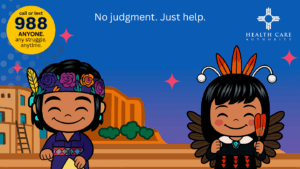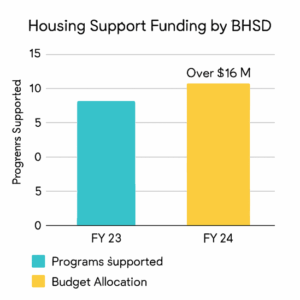ABOUT THE DEPARTMENT
We ensure that New Mexicans attain their highest level of health by providing whole-person, cost-effective, accessible, and high-quality health care and safety-net services.
Behavioral Health Services Division
The Behavioral Health Services Division, along with our partners, is committed to improving New Mexico’s Behavioral Health System, driven by health equity, quality, and access to service for all New Mexicans.
Currently, HCA runs the adult portion of the state’s behavioral health care. For children’s services please contact the Children, Youth and Families Department.
Contact
P.O. Box 2348
Programs
988 New Mexico
ANYONE any struggle. anytime.
CALL. TEXT. CHAT. 24/7/365
New Mexico’s 988 is the 24/7 free and confidential lifeline for emotional, mental, or alcohol and drug use support, made available to all New Mexicans through the Behavioral Health Services Division of the New Mexico Health Care Authority.
To date, there have been over 105,000 connections to New Mexico’s 988 Lifeline. Learn more 988nm.org

988 collaborates with New Mexico’s Nations, Pueblos, and Tribes with care, respect, and integrity—honoring their sovereignty while providing critical support.
Learn more! You are Not Alone
The New Mexico Native American Resource Directory is designed to empower behavioral health providers and advocates by offering a comprehensive listing of culturally relevant resources tailored to Native American communities.
Visit nativeamericanresourcesnm.org to learn more and access the Native American Resource Directory.
____________________________________________________________
As the New Mexico Health Care Authority’s 988 Lifeline celebrates its third anniversary, the state proudly ranks 5th in the nation for per capita 988 connections, a milestone that reflects New Mexicans’ growing trust in the free, confidential mental health and substance use support line.
The three-year milestone comes with a major policy advancement:
Governor Michelle Lujan Grisham’s signing of Senate Bill 535, which ensures permanent funding and long-term support for the state’s 988 Lifeline. The legislation solidifies 988 NM as a foundational and sustainable part of the state’s behavioral health infrastructure and ensures 988 NM remains a trusted, statewide entry point for help.
A Dose of Reality

We’re in this together. The Health Care Authority brings you A Dose of Reality — an opioid addiction prevention, treatment, and recovery campaign dedicated to ensuring every New Mexican has access to quality health care and essential support services.
Learn more at doseofreality.com
Office of Peer Recovery & Engagement
Our Office of Peer Recovery & Engagement (OPRE) program provides training, certification, and support to Certified Peer Support Workers (CPSW) in New Mexico. CPSWs are important and influential members of treatment teams, to include judicial settings, medical settings, and treatment settings.
- Veteran’s Peer Endorsement Training (revitalizing)
This Veteran-focused training is for CPSWs who wish
to work with the veteran population, will be facilitated by CPSW (VIC) trainers. - In collaboration with the SAFE Project, the Integrated-Forensic Peer Recovery Specialist (IFPRS) Trainingwill
be offered to CPSWs interested in pursuing careers
within the judicial system. Currently Nine (9) CPSWs
are in the process of leading this initiative. - In collaboration with UNM,OPRE is finalizing a Pregnancy
Post-Partum Training for CPSWs who will be working with women affected by Opioid Use Disorder. - Supportive Housing Endorsement Training for
CPSWs working with New Mexicans to Find,
Get and Keep Housing. - Certified Older Adult Peer Support (COAPS) Trainings
The next dates for this training is to be announced.
For more information on becoming a CPSW please visit the Behavioral Health Services Division at the New Mexico Healthcare Authority’s nmrecovery.org or reach out to OPRE.BHSD@HCA.NM.GOV
Supportive Housing
Program Overview
Supportive Housing provides both housing and services. This can help people live more stable lives. These programs can help people find housing. They can help people pay for their housing. Rent is paid by vouchers or rental assistance. The programs also offer support and other help. This includes counseling and treatment. It can include job training and education programs. Supportive housing offers help to individuals who have faced long-term or repeated homelessness. It also helps individuals who are disabled. Individuals with a behavioral health diagnosis can also get help.
BHSD supports a range of housing assistance and supportive housing programs including:
- Outreach
- Transitional Housing/Recovery housing
- Homeless shelters
- SOAR (assistance securing disability benefits)
- Rental assistance
- Permanent supportive housing
In SFY25, BHSD supported several (15) housing related programs with $13M. The FY26 budget will be over $16M.
Why are housing assistance and supportive housing resources important?
United State Interagency Council on Homelessness (USICH) Facts:
- People without a home typically die approximately 30 years earlier; higher rates of acute and chronic conditions.
- 40-60% of people experiencing homelessness have a job.
- People with minimum wage jobs must work 86 hours a week to afford a 1-bedroom unit.
- 50% of people are 1 paycheck away from homelessness, 1 crisis away—medical emergency or automobile accident
- Only 37 affordable homes are available for every 100 extremely low-income renters NM 32-40k shortage, per MFA strategic plan in 2021.
- 70% of the lowest wage households spend half their income on rent.
- Every $100 increase in median rent is associated with a 9% rise in homelessness

Prevention
The NM Opioid State Targeted Response Grant (STR) initiative is overseen by the New Mexico Behavioral Health Services Division (BHSD). The goals of the grant are to 1) increase the number of people who receive treatment for opioid use disorder (OUD), 2) increase the number of people who receive OUD recovery services, 3) increase the number of providers implementing Medication Assisted Treatment (MAT), 4) increase the number of trained OUD prevention and treatment providers, and 5) decrease the rate of opioid misuse, opioid overdoses, and opioid-related deaths. The STR grant funds, in part, the training and distribution of Narcan (naloxone) to first responders across the state to use to reverse opioid overdoses as well as training of health care providers to provide MAT to people with OUD.
Services
Mobile Crisis Teams (MCTs)
Mobile crisis intervention demonstrates New Mexico’s unwavering commitment to expanding access to crucial mental health and substance use crisis care. These services are intended to provide rapid response, individual assessment, evaluation, and treatment for individuals across the lifespan when a person is experiencing a behavioral health crisis.
A behavioral health crisis is defined as a turning point in the course of anything decisive or critical in an individual’s life, in which the outcome may decide whether possible negative consequences will follow.
Mobile Crisis Teams bolster our state’s behavioral health care landscape and help us continue working toward a healthier and more resilient community for all.
Services must be available where the individual is experiencing a behavioral health crisis 24 hours a day, 7 days a week, 365 days per year.
Mobile crisis intervention services are intended to stabilize the person in crisis, prevent further deterioration and provide immediate treatment and intervention in a location best suited to meet the needs of the individual and in the least restrictive environment available.
Certified Behavioral Health Clinics (CCBHCs)
A CCBHC is a specially designated clinic that provides a comprehensive range of community based and outpatient mental health, substance use disorder, and primary care screening services.
CCBHCs serve all ages, regardless of diagnosis, insurance, place of residence, or ability to pay.
CCBHCs must provide the following services either directly or by contracting with partner organizations, with an emphasis on providing 24/7 behavioral health crisis care, use of evidence-based practices, care coordination to navigate the provision of whole-person care among hospitals, health care providers, social services and other involved systems, and integration with physical health care.
Core CCBHC services include:
● Screening, diagnosis, and risk assessment
● Patient and family centered treatment planning
● Outpatient mental health/substance use disorder services
● Crisis services (24-hour mobile crisis and crisis stabilization)
● Peer, family support, and counselor services
● Psychiatric rehabilitation services
● Targeted case management
● Outpatient primary care screening and monitoring
● Armed Forces and Veteran’s services
Service Providers
LGBQTIA+ Service Providers
Learn more about the services that are provided to our LGBQTIA+ Community here.
Veterans and Veteran Families Service Providers
Learn more about the services that are provided to Veterans and Veteran Families through the Behavioral Health Services Division of the New Mexico Health Care Authority. Click here
New Mexico Behavioral Health Council (BHPC)
About the BHPC
The New Mexico Behavioral Health Planning Council is primarily volunteers from communities across the state bringing forward the voice of consumers, family members, advocates, and providers to work on improving the quality and availability of effective mental health and substance use disorder prevention, treatment and recovery support services to help serve New Mexicans in every part of the state.
It consists of the following members, all of whom are appointed by the Governor:
- Adults with serious mental illnessFamily members of adults with serious mental illness and of children with severe emotional, neurobiological and behavioral disorders
- Persons with co-occurring disorders
- Native American representatives from a pueblo, an Apache tribe, the Navajo Nation and an urban Native American population
- Behavioral Health Providers
- State agency representatives responsible for:
- Adult mental health and substance use Children’s mental health and substance use education
- Vocational rehabilitation
- Criminal justice
- Juvenile justice
- Housing
- Medicaid and social services
- Health policy planning
- Developmental disabilities planning
- Disabilities issues and advocacy
- Advocates
Statutory Committee
- Adult Substance Use Medicaid (ASAM)
Chaired by the Behavioral Health Services Division or Designee - Native American Subcommitee (NASC)
Chaired by the Secretary of Department of Indian Affairs or Designee - Children’s & Adolescents (CASC)
Chaired by the Secretary of Children, Youth and Families Department or Designee
Consumer Satisfaction Project (CSP)
What is the Consumer Satisfaction Project?
The New Mexico Consumer, Family/Caregiver, and Youth Satisfaction Project (CFYP), also referred to as the Consumer Satisfaction Project (CSP), is an annual survey effort that gathers feedback from adults, family members, and youth who receive state-funded mental health and substance use treatment and support services. The survey includes federally required questions from the Mental Health Statistics Improvement Program (MHSIP), which collects standardized feedback on access, quality, outcomes, and social connectedness to improve mental health services. This data helps identify areas for improvement, informs policy, and promotes accountability. The New Mexico Behavioral Health Collaborative also added questions, including those related to the National Outcome Measures System.
The CSP surveys serve two key purposes:
- To inform ongoing quality improvement efforts aimed at strengthening services in New Mexico; and
- To fulfill federally mandated data reporting requirements
Adults and family members of youth in care participate through telephone interviews conducted by trained family and adult peer advocates. These interviews are conducted with a randomly selected pool of individuals who received services through New Mexico Medicaid or behavioral health programs. The CSP Steering Committee, which includes adult, family and youth advocates, representatives from Managed Care Organizations (MCOs), and staff from relevant state agencies such as the Children, Youth and Families Department and the Health Care Authority, oversees the survey process. The Committee provides guidance, reviews findings, and focuses on developing interventions to improve services based on survey results.
Provider Support
Technical Assistance for Providers on Specialized Behavioral Health Services
Provider support through BHSD is dedicated to helping behavioral health service providers grow and develop to meet the needs of their communities. We can often translate the roadblocks or speed bumps providers face into the technical language used within the Medicaid systems helping to dissolve those blocks. Our team can also help explore pathways for growing your teams or expanding services. Please feel free to reach out to us with any concerns or questions and we’ll work to keep you all moving forward.
Contact: bh.qualityteam@hca.nm.gov
Through technical assistance meetings BHSD’s provider support team can help on topics such as:
- Initiating new services
- Initiating Medicaid enrollments
- Navigating MCO outreach
- Policy and Billing Manual questions
- Connecting providers with resources and supports for clinical and business operations

